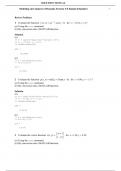Examen
Solutions Manual Modeling and Analysis of Dynamic Systems 3rd edition ByRamin S. Esfandiari, Bei Lu
- Cours
- Établissement
Solutions, Solutions Manual Modeling and Analysis of Dynamic Systems 3rd edition By Ramin S. Esfandiari, Bei Lu. ISBN. 9781315191294. Edfandiari 3e Modeling and Analysis of Dynamic Systems solutions manual.
[Montrer plus]



